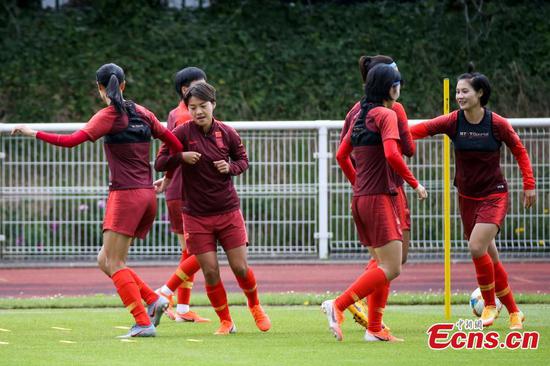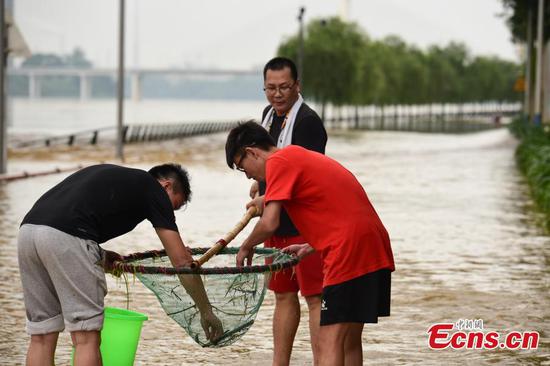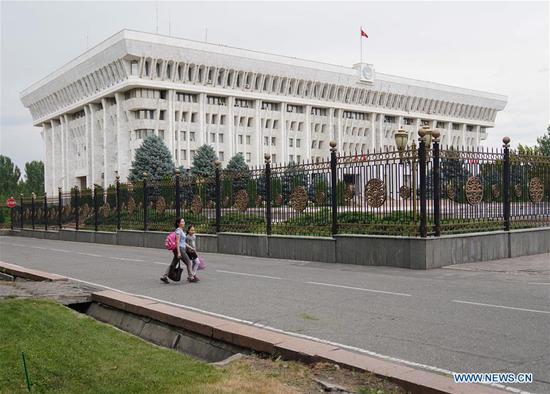
A staff member from the Disease Control and Prevention Center in Haigang district, Qinhuangdao city, Hebei province, helps schoolchildren to fix red ribbons in November to promote AIDS awareness. (Cao Jianxiong/For China Daily)
Charities are providing backup for official measures to provide more classes in schools.
When Li Yan first taught primary school students about sex education, she was embarrassed and unable to speak fluently. Four years later, she is confident of handling every situation that can arise during a class.
"Students at our school are lucky enough to have sex education, but many others still do not have that opportunity," said Li, a teacher of Chinese and sexual and health education at Guiyuan School in Linzhou city, Henan province.
Sex education is taboo in many parts of China because parents and teachers often refuse to get involved. However, the fact is that many children ages 10 to 18 have already learned more about sex than their parents would ever imagine, she said.
While the internet provides easy access to sex-related content and some children share the information with their peers, the indiscriminate nature of sexual knowledge online poses a great challenge to appropriate education.
"Some information online is completely wrong, but it leaves an early impression in children's minds. Without guidance, many may believe that sex education is only about sex in the adult world," said Zhang Meimei, director of the Sex Education Research Center at Capital Normal University in Beijing.
Even though the government has spent decades stressing the significance of sex and health education for students at all grades, issuing more than 80 related policies and guidelines, the results have been mixed.
Now, with government support, some NGOs, such as the AIDS Prevention Education Project for Chinese Youth, are playing a significant role in promoting sex education for both children and adults.
Lack of understanding
Parents are their children's first teachers in every aspect of their lives, including sex education, but many lack a proper attitude toward, and a systematic understanding of, the topic, according to experts.
"It's common for parents to feel embarrassed when discussing sex with their children, so they rely on schools and teachers instead," said Hu Zhen, a professor at Chengdu University's College of Teachers in Sichuan province.
However, despite government policies, leaders of many local education authorities and schools only focus on students' grades and are unwilling to tackle sensitive areas, she added.
She noted that young people are full of curiosity about their bodies, although they do not speak about it publicly. If their questions are not answered, they will try to figure things out by themselves, often via the internet, which could result in misunderstandings.
"Without proper sex education, they are likely to make mistakes; we cannot just count on students to learn that sort of thing by themselves," Hu said.
She recalled giving a sex education lecture at a high school. When she asked the students to write down the things they most wanted to know, the questions were mainly about LGBT issues, sexual activity and venereal disease.
"That may shock parents, but we have to accept that's how juveniles think nowadays," she said.
Hu said many young people from primary school to university repress their curiosity about sex, and no one tells them how to deal with it. Without appropriate guidance, they may devise their own ways of solving an issue, which could result in problems such as sexual assaults on campus, or they may contract a sexually transmitted disease, such as HIV/AIDS.
Zhang, from Capital Normal University, said that while many parents restrict the content their children can access on their computer or smartphone, the children can use other people's phones or computers.
She added that guidance is always better than restriction, because no environment is as clean as parents would like.
"We need to teach children how to make proper decisions and think about the possible consequences," she said.




















































